-
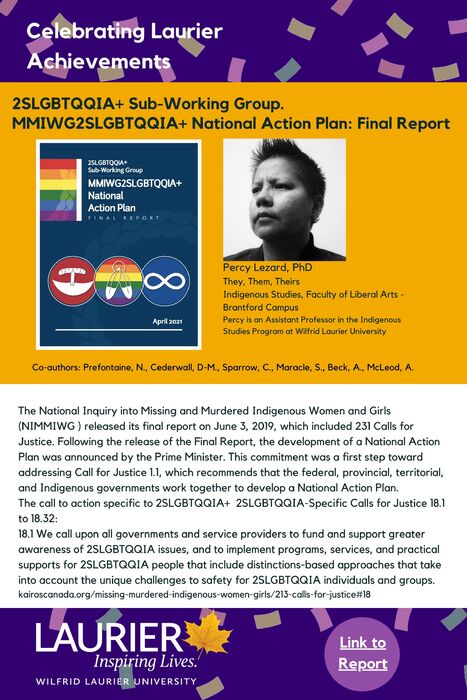
MMIWG2SLGBTQQIA+ National Action Plan: Final Report
The National Inquiry into Missing and Murdered Indigenous Women and Girls (NIMMIWG ) released its final report on June 3, 2019, which included 231 Calls for Justice. Following the release of the Final Report, the development of a National Action Plan was announced by the Prime Minister. This commitment was a first step toward addressing Call for Justice 1.1, which recommends that the federal, provincial, territorial, and Indigenous governments work together to develop a National Action Plan.
The call to action specific to 2SLGBTQQIA+ 2SLGBTQQIA-Specific Calls for Justice 18.1 to 18.32:
18.1 We call upon all governments and service providers to fund and support greater awareness of 2SLGBTQQIA issues, and to implement programs, services, and practical supports for 2SLGBTQQIA people that include distinctions-based approaches that take into account the unique challenges to safety for 2SLGBTQQIA individuals and groups.
kairoscanada.org/missing-murdered-indigenous-women-girls/213-calls-for-justice#18
-

Public Health Survey
The objective of the research project was to better understand the demographics, attitudes and professional concerns of public health professionals in Canada with particular emphasis on the interaction between scientific evidence and policymakers. The team designed and executed a pair of surveys that was fielded to two different populations: Canadian public health professionals and the general population. These surveys asked questions that solicit respondents’ experiences with the COVID-19 pandemic, their general political attitudes, and demographic characteristics. Public health professionals were also asked unique questions about how they interacted with policy makers and political leaders during the COVID-19 pandemic. The information gleaned from this analysis will improve the capacity to advocate for public health measures and provide effective advice to the public and policymakers.
-

Memories of Brantford's Jewish Community
Christina Han is unearthing and preserving Brantford’s diverse immigrant history. She collaborated with the Canadian Industrial Heritage Centre, the Ontario Jewish Archives, the Brant Museum and Archives, Brant Theatre Workshops and her students to create Memories of Brantford’s Jewish Community, a November 2019 exhibition featuring historical artifacts, live readings and walking tours.
-

Design Challenge on Climate Change
In March 2021,the User Experience Design Program hosted a nationwide design challenge on climate change called the "Laurier Design for Change User Experience (UX) competition". Over 120 participants from nearly 50 universities and colleges across Canada were challenged to develop and design solutions to transform social behaviour toward greener and more sustainable practices.
-
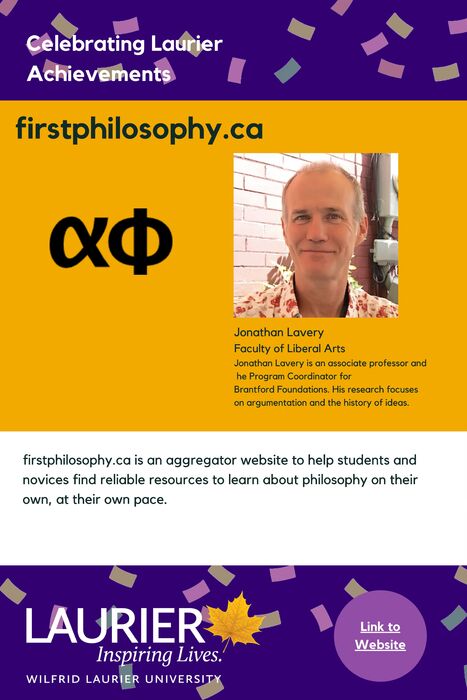
firstphilosophy.ca
firstphilosophy.ca is an aggregator website to help students and novices find reliable resources to learn about philosophy on their own.
-
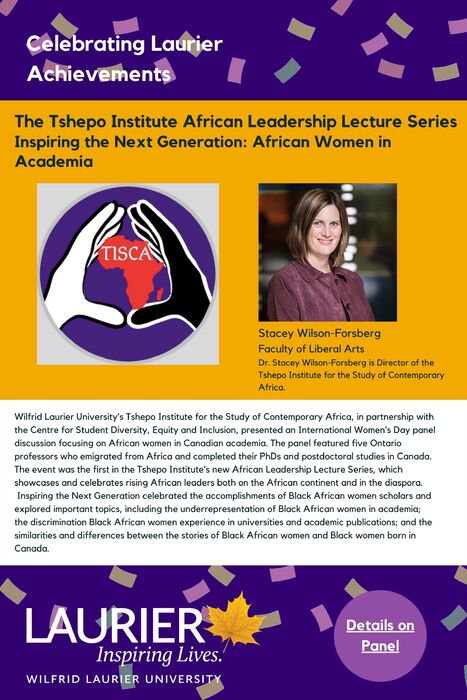
The Tshepo Institute African Women Leaders Public lectures: Inaugural lecture - Inspiring the Next Generation: African Women in Academia
Wilfrid Laurier University’s Tshepo Institute for the Study of Contemporary Africa, in partnership with the Centre for Student Diversity, Equity and Inclusion, will present an International Women’s Day panel discussion focusing on African women in Canadian academia. The panel will feature five Ontario professors who emigrated from Africa and completed their PhDs and postdoctoral studies in Canada. The event is the first in the Tshepo Institute’s new African Leadership Lecture Series, which showcases and celebrates rising African leaders both on the African continent and in the diaspora. nspiring the Next Generation celebrated the accomplishments of Black African women scholars and explored important topics, including the underrepresentation of Black African women in academia; the discrimination Black African women experience in universities and academic publications; and the similarities and differences between the stories of Black African women and Black women born in Canada.
-
The School and Labour Market Transitions of African Youth in Canada
On average, immigrants tend to be better educated than non-immigrant Canadians, an outcome that is at least partly due to Canada’s immigrant selection rules in the economic stream, which favour education.
Our research has shown that while many students face academic challenges in transitioning to high school and university, including those related to course selection, a lack of guidance both at school and home when making decisions is particularly pronounced for Black African youth with refugee backgrounds.
Beyond mentorship and tailored information about educational choices and career possibilities, African youth also need the tools, training, and confidence to make their own educational and career decisions.
This paper and lecture provided an overview of our research with African youth, highlighting projects designed with our community partners to build the skills and confidence among the youth and their parents to make decisions that affect their education and lives.
-

CRSP Talk Podcast Episode 1: Exploring Podcast Options for Knowledge Mobilization
In this podcast episode, we discuss the advantages of using podcasting as a way of sharing research findings. Because there is a diverse range of podcasting formats, selecting the one most appropriate for communicating your research stories can be difficult. To make choosing the right format a little easier, we explore the characteristics of four popular podcasting styles.
-
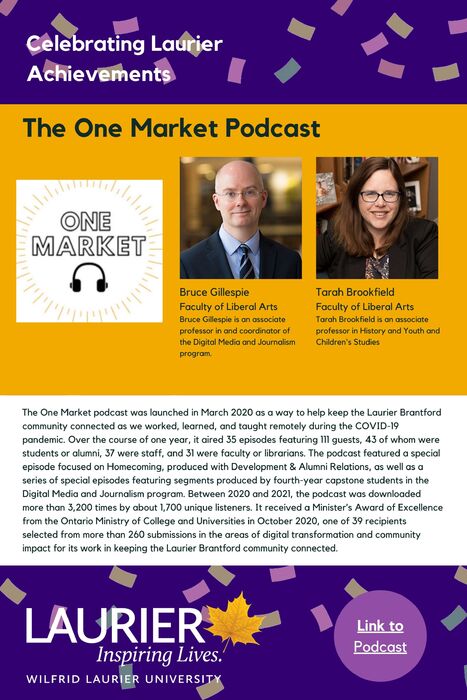
The One Market Podcast
The One Market podcast was launched in March 2020 as a way to help keep the Laurier Brantford community connected as we worked, learned, and taught remotely during the COVID-19 pandemic. Over the course of one year, it aired 35 episodes featuring 111 guests, 43 of whom were students or alumni, 37 were staff, and 31 were faculty or librarians. The podcast featured a special episode focused on Homecoming, produced with Development & Alumni Relations, as well as a series of special episodes featuring segments produced by fourth-year capstone students in the Digital Media and Journalism program. Between 2020 and 2021, the podcast was downloaded more than 3,200 times by about 1,700 unique listeners. It received a Minister’s Award of Excellence from the Ontario Ministry of College and Universities in October 2020, one of 39 recipients selected from more than 260 submissions in the areas of digital transformation and community impact for its work in keeping the Laurier Brantford community connected.
-
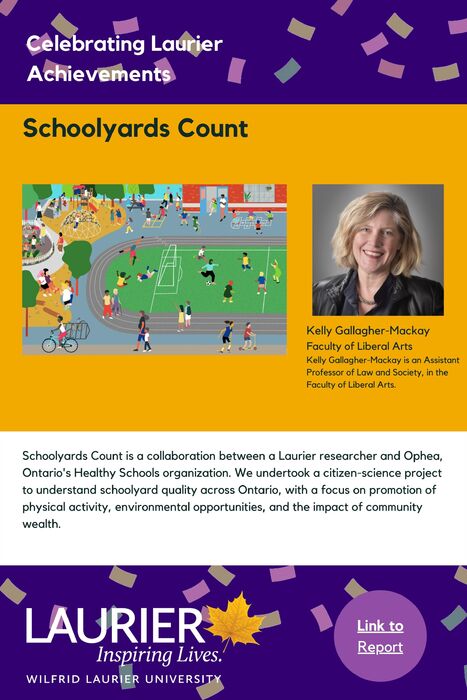
Schoolyards Count
Schoolyards Count is a collaboration between a Laurier researcher and Ophea, Ontario's Healthy Schools organization. We undertook a citizen-science project to understand schoolyard quality across Ontario, with a focus on promotion of physical activity, environmental opportunities, and the impact of community wealth.
-
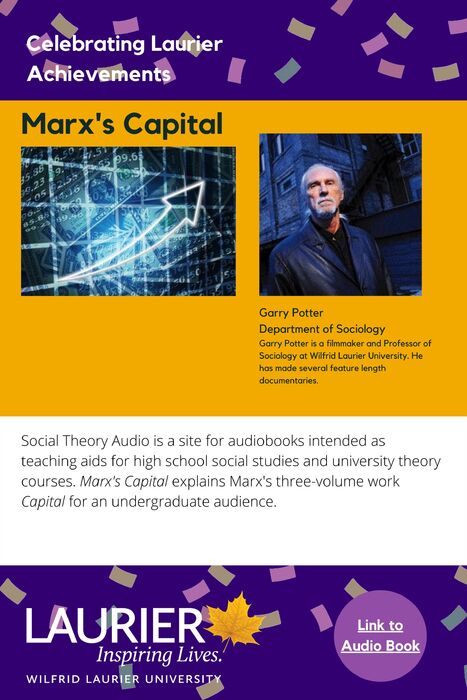
Marx's Capital
Social Theory Audio is a site for audiobooks intended as teaching aids for high school social studies and university theory courses. Marx's Capital explains Marx's three-volume work Capital for an undergraduate audience.
-

Living Beyond the Borders: Essays on Global Immigrants and Refugees
Cross-border migration has resulted in many social, cultural, economic, and political challenges that need attention. Globalization, migration, and transnationalism have a strong impact on the lives of diasporic immigrants and refugees. Living Beyond the Borders highlights the Canadian immigration policies and the challenges faced by migrants, particularly visible minorities.
The contributors to this volume analyze the impact of transnational lives on the identity construction of migrants and how they acquire and negotiate their multiple identities. The book further interrogates these identities by questioning the experiences of immigrants and refugees living precarious lives in their country of permanent or temporary settlement.
-
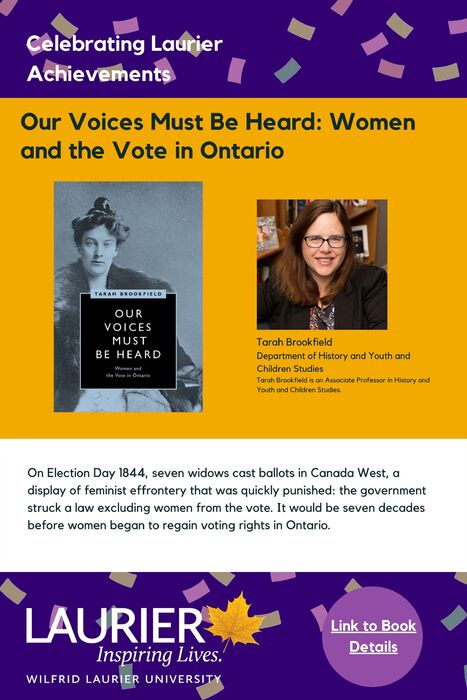
Our Voices Must be Heard: Women and the Vote Ontario
On Election Day 1844, seven widows cast ballots in Canada West, a display of feminist effrontery that was quickly punished: the government struck a law excluding women from the vote. It would be seven decades before women began to regain voting rights in Ontario.











